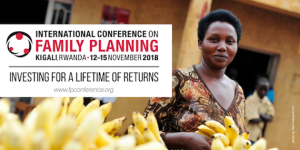What are Environmentalists Doing at a Family Planning Conference?
Nov 19th, 2018 | By admin | Category: Family PlanningBy Suzanne York.
This question came up a few times at the International Conference on Family Planning (ICFP), a biennial gathering of reproductive health and rights advocates. This year’s conference included a small number of attendees who address both reproductive health and conservation/environmental rights through a development approach known as PHE, or population, health and environment.
The Benefits of Integration
PHE is an integrated approach linking family planning, health and conservation that recognizes the interconnectedness of people, their health and their local environment.
Some of the benefits of PHE model include:
- Increased access to and use of contraceptives by integrating family planning; into non-health sector development projects;
- Improved health outcomes, especially in very remote underserved areas;
- Greater buy in from communities;
- Greater involvement in natural resource management activities due to the incorporation of health, livelihood, and micro-credit components;
- Increased access to and involvement of males in family planning and reproductive health;
- Increased access to and involvement of females in conservation and natural resource management activities.
The Connection Between Rights and Conservation
So what do environmental advocates and activists hope to achieve amongst a crowd focused on sexual and reproductive health and rights? It is that by taking an integrated, multi-sectoral approach to development, that communities will improve lives and co-exist with a healthy and thriving natural world.
Achilles Byaruhanga, Executive Director of Nature Uganda, supports empowering communities in western Uganda and conserving wetlands (home to the threatened grey crowned crane). The country of Uganda, currently with just over 40 million people, is growing at a rate of 3.4 %, and is on track to hit 120 million people by 2050. Mr. Byaruhanga spoke of the critical importance of integrating family planning and community health initiatives with conservation programs.To reduce pressure on ecosystems, Nature Uganda works with local communities to improve reproductive health (through education and access to contraceptives, keep girls in school, and create sustainable incomes and livelihoods. According to Mr. Byaruhanga, “our conservation challenge is population.”
Harriet Davies-Mostert, Head of Conservation for the Endangered Wildlife Trust in South Africa, noted the 7.6 billion people on the planet today still only make up .01% of all living things on Earth. There is an incredible amount of biodiversity in the world.
The Endangered Wildlife Trust views family planning as a win-win for women and conservation. It works to educate community members in the North West province of South Africa on the benefits of family planning and how it leads to more successful conservation efforts. They call their work “future planning” and include men as well, to help ensure lasting change.
Dr. Davies-Mostert is collaborating with colleagues from the Margret Pyke Trust to take action to remove barriers to family planning as an integral part of conservation policy. This effort is in support of the idea that we all thrive together when we link environmental conservation with family planning and reproductive rights and health.
Many other PHE advocates from around the world also presented at various workshops on their successful experiences with the PHE model in their respective regions. This includes the PHE Ethiopia Consortium, Doreen Othero of the Lake Victoria Basin Commission, and Joan Castro of the PATH Foundation Philippines. All of these people have been speaking at both reproductive health and rights conferences and climate change/environmental issues conferences, to get out the message of the importance of an integrated approach to both sectors.
It’s Good for People, and for Nature
Jane Goodall appeared in a video during the first full day at the International Conference on Family Planning. As many people know, she has a lifetime of experience with people and animals, and has seen up close how the rights of nature goes hand in hand with human rights.
Dr. Goodall said that we need to alleviate poverty, live more sustainability (stop taking nature’s resources) and “address our growing human population – we are literally destroying our planet,” she stated.
Most important for this audience of reproductive rights and health advocates, Dr. Goodall emphasized, “It is impossible to overemphasize the importance of family planning for the good of the children and the good of the environment.” This is what both sectors need to better fully understand – it’s all connected, and we move forward together.
Suzanne York is Director of Transition Earth.


![Achilles Byaruhanga of Nature Uganda, at the ICFP [photo: Suzanne York]](http://populationgrowth.org/wp-content/uploads/2018/11/achilles-1-1024x940.jpg)
![Harriet Davies-Mostert of Endangered Wildlife Trust at ICFP [photo: Suzanne York]](http://populationgrowth.org/wp-content/uploads/2018/11/Harriet-1-1024x622.jpg)